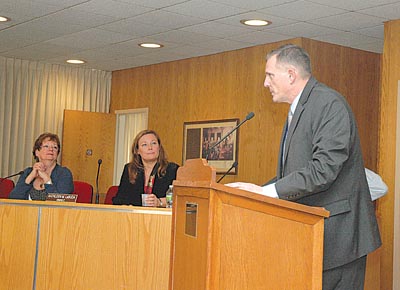
|
Dan Hust | Democrat
Sullivan County Volunteer Firefighters Association Recording Secretary Chet Smith tells legislators he feels the planned emergency radio upgrades are necessary.
|
Legislature wrap: waste fees, fraud, 'Sandy'
Story by Dan Hust
MONTICELLO — November’s legislative committee meetings included more details on the 2013 solid waste fees, the proposed chief fraud investigator, Hurricane Sandy recovery efforts and the Spanish ballots used on Election Day.
Revisiting solid waste fees
While legislators voted 7-2 on Thursday to approve the 2013 solid waste fee schedule (with Cora Edwards and Alan Sorensen opposed), they also agreed to revisit the highly unpopular fees come January.
The fees are not increasing for 2013, but both Edwards and Cindy Gieger felt the setup is not as fair as it could be, expressing constituents’ concerns that users who generate more trash don’t necessarily pay more than others.
Legislator Jonathan Rouis – who was part of the Legislature that labored over the creation of the fee system two years ago – pointed out that the waste fee is an “access fee,” as opposed to a “tipping fee,” which is additionally assessed on larger users for the amount of trash they dump.
County Manager David Fanslau said the access fees bring in around $5.5 million a year and pay down the debt on the landfill and solid waste system.
“Nobody likes it,” acknowledged Rouis, “but we have to pay for the system.”
Though she noted that even people without children must pay for the public education system, Legislator Kathy LaBuda said she’d be willing to chair a committee to review the fees next year.
More on fraud investigator
Health and Family Services Commissioner Randy Parker gave legislators further details Thursday on the proposed chief fraud investigator – a position which is estimated to be about $100,000 a year in salary and benefits (but will cost the county about $25,000, thanks to federal and state reimbursements).
The administrative position is already in the proposed 2013 county budget.
“Yes, it is the creation of a new position ... but it’s part of an overall restructuring,” Parker explained, noting that his division will have four less people next year and has already reduced its budget by $1.8 million.
He expects this investigator to save money as well, pointing out that he/she will investigate all potential fraud and abuse in the division – not just in Medicaid but in things like formal/informal daycare, food stamps and public assistance.
“I believe it will pay for itself over the course of time,” he predicted, relating a tale of someone coming from California to obtain benefits, along with complaints of food stamps being sold for cash on local streets.
“I think creating this position is absolutely the responsible thing to do,” agreed Legislator Gieger. “... For every dollar lost in fraud, waste and abuse, that dollar does not go to our needy.”
Legislator Kitty Vetter said she supported the concept but would prefer a nine-month testing phase to see how much the investigator could uncover. That remains to be discussed further.
It’s likely that if and when the county does hire for the position, it will be filled provisionally, as the employee will have to take a Civil Service exam. But Parker said any candidate will already have to have a bachelor’s degree and prior supervisory experience in law enforcement investigations.
While lauding the fraud detection staff currently employed by the county, Parker said the new investigator will help establish a “zero tolerance” policy.
“We exist to help people get through a difficult situation,” he explained, “not to become a way of life.”
Recovering from Hurricane Sandy
County officials gave reports at three different meetings this month – including Nov. 8, the day the county’s Emergency Operations Center ceased 24/7 activity after 16 days of operation.
Federal Emergency Management Agency (FEMA) personnel had already been in the county the Friday after Sandy’s arrival and indicated Sullivan County met the eligibility criteria for disaster assistance. (Subsequently both individual and municipal assistance was granted to the county.)
Deputy Public Works Commissioner Ed McAndrew said county staff had prepared for the storm but still had a lot of work to do after Sandy passed.
“One of our guys had to come in on an ATV, cutting his way into Livingston Manor,” McAndrew related, noting crews were clearing trees from roads dawn till dusk.
“We did have close to 200 roads closed during the storm,” Fanslau explained, speaking of town, county and state routes.
“We are still looking at probably another 3-4 weeks of clearing roads,” added McAndrew – though most are open.
Public Safety Commissioner Dick Martinkovic shared another story, where the Sheriff’s Office provided a generator seized as evidence in a recent high-profile drug bust.
That generator allowed the county to open the powerless airport’s hangar doors to free the LifeNet helicopter to answer calls.
“You guys really have worked very hard,” thanked Legislator Kitty Vetter.
Post-Election Day
Sullivan County Board of Elections commissioners Rodney Gaebel and Ann Prusinski told legislators that only seven of the federally-required Spanish ballots were used – four in Woodridge alone – on Election Day.
“There were no interpretive issues,” Gaebel remarked, adding that 300 Spanish ballots were printed at 60 cents apiece.
But at least one polling site ran out of affidavit ballots (due to Sandy-displaced voters), requiring the use of three Spanish ballots for English-speaking voters.
“We did see an extremely high voter turnout,” said Prusinski, pegging it around 65 percent of the county’s eligible voters.




